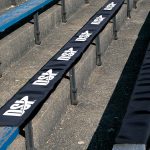Let’s Talk About Heat
It’s Texas Tour week! The first week of #DCI2019 in which all the tops corps finally gather together. This Saturday, corps will gather for the first of 4 regionals leading up to the 2019 Drum Corps International World Championships. They’ve caravanned across the country, worked tirelessly since May to create their product, and now, the groups will join up to perform together, many for the first time.
Although the first #TexasTour events do not take place until Thursday, July 18 (Denton, TX and Belton, TX), many of the corps will be arriving earlier. Typically, the days leading up to Texas Tour are spent in rehearsals. These necessary days solidify the skills, choreography, and music members have worked hard on in these last months. Additionally, the Sunday following the DCI Southwestern Classic in San Antonio, TX is more often than not a “free day” for the members. This is a much needed rest and recovery day before corps continue touring across the southern US.
 National Weather Service heat index chart.
The NFHS Band Safety course outlines guidelines and tools needed to understand heat risk and how to mitigate that risk.
National Weather Service heat index chart.
The NFHS Band Safety course outlines guidelines and tools needed to understand heat risk and how to mitigate that risk.
 Yes, you do need it. In order to maintain optimal performance, every member of the marching ensemble needs to hydrate properly. Additionally, any leader facilitating these rehearsals needs to ensure adequate opportunities to hydrate are budgeted into the rehearsal time. Everyone from parents, to students, to staff needs to ensure that weather conditions are properly heeded.
The best ways to handle rehearsal in hot conditions is to (1) ensure you are properly hydrated, (2) rest your body with adequate sleep or down time, (3) replenish salt stores in the body, and (4) limit the amount of exposure your body has to the sun and heat. But most importantly, be accountable of your role in these conditions! Here are some tips:
Yes, you do need it. In order to maintain optimal performance, every member of the marching ensemble needs to hydrate properly. Additionally, any leader facilitating these rehearsals needs to ensure adequate opportunities to hydrate are budgeted into the rehearsal time. Everyone from parents, to students, to staff needs to ensure that weather conditions are properly heeded.
The best ways to handle rehearsal in hot conditions is to (1) ensure you are properly hydrated, (2) rest your body with adequate sleep or down time, (3) replenish salt stores in the body, and (4) limit the amount of exposure your body has to the sun and heat. But most importantly, be accountable of your role in these conditions! Here are some tips:
 Staff Members & Directors
Staff Members & Directors

 Parents, Leaders, & Volunteers
Parents, Leaders, & Volunteers
Heat.
So let’s talk about heat. For anyone who has ever traveled to Texas, you know that the environment is dramatically different depending on the region of Texas you are in. Some areas are hot and extremely dry, whereas others make a person feel like they’re swimming in the air around them. The week following Texas, leading up to the DCI Southeastern Championship in Atlanta, GA (affectionately known as “Hotlanta”) is typically extremely hot and humid as well. No matter if you are an elite level drum corps performer, a high school student attending his/her first band camp, or a staff member facilitating rehearsal, heat is a serious risk. In order to maintain peak performance, members and staff need to understand excessive heat and it’s risks. National Weather Service heat index chart.
The NFHS Band Safety course outlines guidelines and tools needed to understand heat risk and how to mitigate that risk.
National Weather Service heat index chart.
The NFHS Band Safety course outlines guidelines and tools needed to understand heat risk and how to mitigate that risk.
- Concerns directly related to heat include: excessive heat, hydration, nutrition, and rest. Don’t hesitate to modify activities based on changing weather conditions or a pulse check of the ensemble. Having and implementing a heat and hydration plan makes it easier for directors to make these important decisions as conditions are monitored.
- Heat illness occurs when the body reaches a temperature of 104 degrees.
- Ensure all staff members, students leaders, and volunteers can identify the signs of heat-related illnesses.
- Understand the impact of humidity. Perspiration helps the body cool off. When high humidity exists in the air, “perspiration is slower to evaporate.” The higher the humidity, the hotter it feels. This combined temperature + humidity = the heat index.
- Resources for measuring humidity and heat index include: The National Weather Service heat index chart (above), a “Heat Index” app produced by OSHA, and a hygrometer.
- FYI: Turf and asphalt surfaces will be hotter than grass. Consider the rehearsal environment when detailing your hydration and rest plan for rehearsal.
Treat your body well.
 Yes, you do need it. In order to maintain optimal performance, every member of the marching ensemble needs to hydrate properly. Additionally, any leader facilitating these rehearsals needs to ensure adequate opportunities to hydrate are budgeted into the rehearsal time. Everyone from parents, to students, to staff needs to ensure that weather conditions are properly heeded.
The best ways to handle rehearsal in hot conditions is to (1) ensure you are properly hydrated, (2) rest your body with adequate sleep or down time, (3) replenish salt stores in the body, and (4) limit the amount of exposure your body has to the sun and heat. But most importantly, be accountable of your role in these conditions! Here are some tips:
Yes, you do need it. In order to maintain optimal performance, every member of the marching ensemble needs to hydrate properly. Additionally, any leader facilitating these rehearsals needs to ensure adequate opportunities to hydrate are budgeted into the rehearsal time. Everyone from parents, to students, to staff needs to ensure that weather conditions are properly heeded.
The best ways to handle rehearsal in hot conditions is to (1) ensure you are properly hydrated, (2) rest your body with adequate sleep or down time, (3) replenish salt stores in the body, and (4) limit the amount of exposure your body has to the sun and heat. But most importantly, be accountable of your role in these conditions! Here are some tips:
 Staff Members & Directors
Staff Members & Directors
- Have an excessive heat plan that allows for hydration & recovery.
- Hydrate your students often (even if it is just a “gush-n-go”).
- Provide readily available water refill stations (optimizes your rehearsal time and keeps them hydrated).
- Have a shady space available for longer breaks.
- Verbally encourage students to drink & apply sunscreen.
- Model hydration and heat recovery practices (avoid coolers of “staff drinks” that don’t communicate your expectations of them).
- Educate students on proper practice in excessive heat.

Students
- Hydrate the day before a long rehearsal.
- Drink water before bed & first thing in the morning.
- Avoid coffee, soda, & sugary juices the morning of a rehearsal.
- Hydrate on EVERY rest break.
- Secure a large enough water jug so you don’t have to run inside during every water break.
- Avoid chugging ice cold water.
- During meals, replenish salt lost through sweating with an electrolyte beverage.
- Wear clothing that covers the body, wear a hat & sunglasses, & rest in shade or air conditioning whenever possible.
- SLEEP!
 Parents, Leaders, & Volunteers
Parents, Leaders, & Volunteers
- Encourage your sections to be self-accountable.
- Ensure your student leaves the house with ENOUGH water (do a water check).
- Volunteer to be on “water station duty.”
- Ask your director how you can get involved and help students.
- Ensure your student is sleeping & recovering enough.
- Educate students on proper practice in excessive heat.
- Identify students that are “toughing it out” and have this conversation with them.
- Model the expectations you have for your student.



